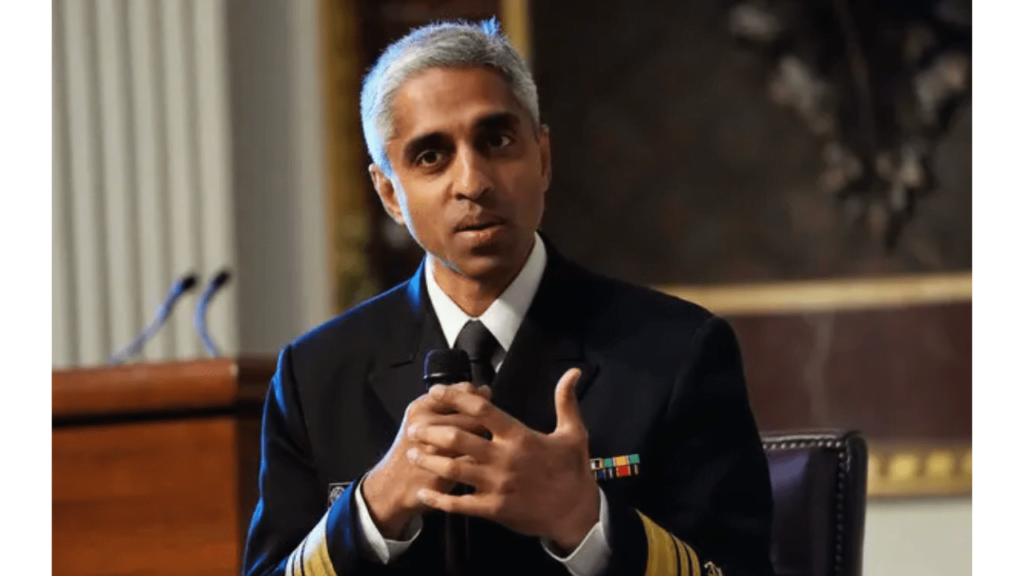
In a bold move to protect children and teenagers, U.S. Surgeon General Dr. Vivek H. Murthy has called for the implementation of social media warning labels on respective platforms. Just like the warnings on tobacco and alcohol products, these labels would alert users to the potential mental health risks associated with platforms such as Facebook, Instagram, and TikTok.
Why This Matters?
Dr. Murthy’s call to action, detailed in a New York Times opinion piece, highlights the urgent need for clear and visible warnings on social media. These labels aim to remind parents and adolescents that social media has not been proven safe for young users. The comparison to tobacco and alcohol underscores the potential severity of the risks involved.
Research has shown that extensive social media use can lead to increased anxiety and depression among adolescents. Many young users also report that these platforms negatively affect their body image. Given this evidence, Dr. Murthy believes that warning labels are essential to raising awareness and encouraging healthier behaviors.
Legislative Efforts and Increasing Scrutiny
This push for warning labels comes amid a growing wave of scrutiny from regulators and legislators concerned about the link between social media use and children’s mental health. Lawmakers have compared the tech industry’s impact on youth to that of Big Tobacco, calling for swift action to address what they see as a driving force behind the youth mental health crisis.
Despite widespread concern, there is still debate within the scientific community about the exact extent to which social media causes mental health issues in young people. Researchers and public officials are advocating for more federal funding to study this topic in depth. They also criticize tech companies for not making enough internal data available for public scrutiny.
Acting on Available Evidence
Dr. Murthy argues that waiting for perfect information isn’t an option when it comes to safeguarding children’s health. Drawing on his medical training, he stresses that immediate action is necessary, even if some research gaps remain.
Several states have already passed laws to protect children from the potential harms of social media. These laws include measures such as banning young children from using social media platforms and requiring parental approval for teens. However, these regulations have faced legal challenges from tech industry groups, which argue that they are unconstitutional and infringe on free speech rights.
The Role of Social Media Warning Labels
While warning labels alone won’t make social media safe for young people, Dr. Murthy believes they are a crucial first step. Such labels would serve as a constant reminder to parents and adolescents about the potential mental health risks associated with social media use. Evidence from tobacco studies suggests that warning labels can effectively increase awareness and change behavior.
According to the Pew Research Center, social media use is widespread among young people. About 95% of those aged 13 to 17 use a social media platform, with more than a third using it “almost constantly.” Given this high usage, the need for social media warning labels becomes even more urgent.

Industry Pushback and Legal Challenges
Implementing warning labels will require congressional action and is likely to face legal challenges from tech companies. Adam Kovacevich, CEO of the tech industry policy group Chamber of Progress, argues that warning labels are scientifically unsound and infringe on free speech rights. He also points out that many teens view social media as an important outlet for social connection.
Dr. Murthy has previously stated that there isn’t enough evidence to prove that social media is safe for children and teens. He has called for policymakers to address the harms of social media with the same rigor applied to other products designed for children, such as car seats and baby formula.
Beyond Warning Labels
Dr. Murthy’s vision for protecting young people goes beyond just warning labels. He advocates for comprehensive legislation to shield children from online harassment, abuse, and exposure to harmful content. This includes preventing platforms from collecting sensitive data from children and restricting features like push notifications, autoplay, and infinite scroll, which can contribute to excessive use.
Senators Marsha Blackburn and Richard Blumenthal have voiced their support for Dr. Murthy’s recommendations, emphasizing the urgent need to address the harmful impact of social media on children.
Conclusion
The Surgeon General’s call for social media warning labels marks a significant step in addressing the mental health crisis among adolescents. As legislative efforts continue, it is crucial for policymakers and tech companies to work together to create a safer digital environment for young users. By raising awareness and implementing protective measures, we can help mitigate the risks posed by social media and promote healthier online habits for the next generation.
This article aims to provide a comprehensive yet accessible overview of the Surgeon General’s recommendations and the broader context of legislative efforts to protect young people online. By doing so, it seeks to inform and engage readers on this critical issue.
Read Next:

The Psychology of Love: Why Valentines Day Matters More Epic Than You Think
Discover the psychology of love and why Valentines Day is more important than you think. Learn how love impacts the brain, strengthens relationships, and boosts

Premier League Highlights: Arsenal Humiliate Man City 5-1, Spurs and Palace Secure Crucial Wins
Arsenal demolished Manchester City 5-1 in a statement premier league highlights win, reigniting their title hopes. Meanwhile, Crystal Palace stunned Man United 2-0, and Tottenham

How Budget 2025 Impacts the Indian Middle-Class: Major Tax Benefits and Glaring Omissions
Budget 2025 offers major tax relief to the middle class, including zero tax on incomes up to ₹12 lakh. However, it misses out on incentives
